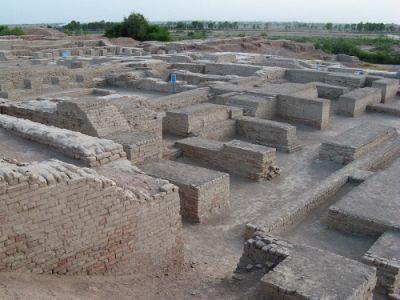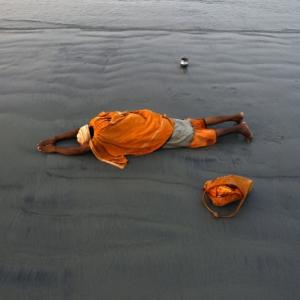 'South Asian studies' academics in the US would do well to introspect how they wittingly or unwittingly become part of Pakistan's proxy war in wielding influence over academics and policy, says Sankrant Sanu.
'South Asian studies' academics in the US would do well to introspect how they wittingly or unwittingly become part of Pakistan's proxy war in wielding influence over academics and policy, says Sankrant Sanu.
In the early 2000s I tracked the activities of an organisation called the Kashmir American Council, started by Ghulam Nabi Fai. KAC conferences regularly included prominent Indian Leftists in the US such as Angana Chatterji who would excoriate India for 'human rights violations' in Kashmir.
According to The Atlantic (external link), Chatterji was among 20 special guests that Fai flew, all expenses paid, to a five-star conference in Uruguay about 'human rights' in Kashmir.
Later Fai was exposed as being a front for Pakistan's spy agency and pleaded guilty (external link) to receiving millions of dollars of illicit ISI funding for his US lobbying efforts.
While Chatterji and others denied knowing about Fai's ISI links, the issues that the Fai episode raised go beyond that. Of concern remains the fact that the anti-India work of certain scholars neatly aligns with Pakistan's advocacy agendas, whether or not direct funding from Pakistan is being received.
Another Indian-origin 'radical' academic Kamala Visweswaran has been leading the fight to erase references to India (external link), and replace these with 'South Asia' from textbooks in California.
How does this relate, if at all, to the issues raised by the Fai episode? For this we have to look at two aspects. One, at the goals of Pakistan's multi-million dollar advocacy campaigns in the US, and two, how the work of some Indian Marxist academics in 'South Asian studies', whether by accident or by design, actively support those goals.
Unlike India, Pakistan is a client State that is heavily dependent on funding, particularly from the US, for its defence needs. It also is, as C Christine Fair points out, a revisionist State (external link), one that seeks to change the status quo in Kashmir.
As a revisionist State it is hampered in its goals by the fact that India is much bigger -- economically, militarily and geographically -- than Pakistan. Thus it sees influencing government and academia in the US as critical to both a continuing flow of funds as well as leverage over India while such influence is of relatively lower importance for the Indian State.
Practically, Pakistan's goals in influencing public opinions, particularly in think-tanks and academia include 1. continued hyphenation of the India-Pakistan relationship with Kashmir as the outstanding issue needing resolution; 2. to project Indian Kashmir as 'occupied territory' and highlight 'human rights' issues there while keeping its occupation and abuses in Pakistan occupied Kashmir, Gilgit-Baltistan out of the discourse; 3. hurt India's soft power and rising economic power that it sees as a threat to its territorial ambitions; 4. keep the independence movement in Balochistan and its widespread human rights abuses there out of view; 5. create a narrative of India as a source of terrorism to counter the well-documented reality of Pakistan's support for 'non-State' terrorist actors; and finally, 6. promote a 'there was no India' narrative to help in a goal to create a 'national history that seeks to claim Pakistan's pre-Islamic past in an attempt to compete with India's historic antiquity' (Ayesha Jalal, Conjuring Pakistan: History as Official Imagining, International Journal of Middle East Studies, 27, (1995), 73 to 89, here (external link).
Given this, Visweswaran's work can be seen as an example of the confluence of some South Asian academics' work and activism with the Pakistani establishment goals. This individual confluence may well be coincidental, and our idea is not to single out Visweswaran as an individual but use her work as an illustration of a larger malaise, of the rot in 'South Asian' academics and throw light on other academic signatories of these petitions.
Visweswaran is the queen of petitions, a petitionista par excellence. In February 2016, she petitioned for the erasure of references to India in California textbooks, to be replaced by 'South Asia.'
Earlier, in 2015, she was part of the petition urging Silicon Valley companies to boycott Prime Minister Narendra Modi's visit and to not work with India (external link). She was part of earlier petitions to prevent Modi as Gujarat's chief minister to come to the US.
Visweswaran has also been actively involved with FOIL (Forum of Inquilabi Leftists) and the related FOSA (Forum of South Asia), self-described 'radical activist' organisations whose members support various violent insurgencies in India, including those by ultra-left 'Maoists.'
Interestingly, the Fai-linked Angana Chatterji has also been active in these two radical left organisations.
Saying this is not to mean that Visweswaran is funded by the ISI nor are we even implying it. But we do point out that her positions have been consistently aligned with the goals of the Pakistan establishment we laid our earlier.
Her petitions against Silicon Valley's economic collaboration with India attack India's economic interests.
Her California textbooks petition, for instance, reveals explicit awareness of the Pakistani agenda. The proposed edits suggest multiple insertions of the term 'Pakistan', and the agenda of replacing India with 'South Asia' is stated at the outset.
This is an ahistorical stance, since variations of the term 'India' have been vogue to refer to this region from before the time of the Greek traveller Megasthenes' work Indica in the 3rd and 4th centuries BC while both 'Pakistan' and 'South Asia' are 20th century creations with no historic precedence.
If it is argued that the boundaries of modern India are somewhat reduced, it's worth a mention that the term 'India' also referred to present-day Bangladesh, but Visweswaran's recommendations do not include a single reference to that term.
The Mauryan empire, for instance, had its capital in modern-day Bihar and included most of present-day Bangladesh. Yet, even when referring to the Mauryan empire, Visweswaran does not bring up Bangladesh, keeping a persistent focus towards the inclusion of the term Pakistan.
Visweswaran's proposed edits (external link) claim to be countering changes by imagined 'Hindu nationalists' in the US.
Commenting on a previous set of changes, the document states: 'Indeed, apparently responding to pressure from Hindu nationalist and community organisations, several deleterious changes have been made... '
What drives these changes? To understand Visweswaran's motivations there are also possibilities of sympathies beyond links to Pakistan. For instance, in a passage dealing with the most significant event in the US in the 21st century, the bombing of the World Trade Centre on September 11, 2001, Visweswaran recommends the following change:
'On p. 498 we recommend that the sentences, "Anti-Western violence perpetrated by the followers of a fundamentalist version of Islam has contributed to the appearance of deep conflict between the Islamic and Western worlds, especially since 9/11. Students should learn about the roots of modern Islamic extremism by reading a variety of sources from Egyptian writers and the Muslim Brotherhood," for example be changed to, "Anti-Western violence has contributed to the appearance of deep conflict between the West and other parts of the world. Students should learn about the roots of modern religious extremism by reading a variety of sources from Christian, Jewish, Islamic, Hindu and Buddhist nationalist texts."
So, 9/11 must be erased and the 'appearance of deep conflict between the Islamic and Western worlds' must somehow allude to 'Hindu and Buddhist texts'!
While Visweswaran repeatedly points out others' motivations in the proposed textbook edits, she appears completely oblivious to documented advocacy by the Pakistani establishment in the US.
'South Asian studies' academics would do well to introspect how they wittingly or unwittingly become part of Pakistan's proxy war in wielding influence over academics and policy in the United States.
IMAGE: A city settlement of the Indus Valley civilisation at Mohenjodaro in what is today Pakistan. Photograph: Kind courtesy Wikimedia Commons.
Sankrant Sanu is a former Microsoft manager and an IITian. The views expressed are personal.







